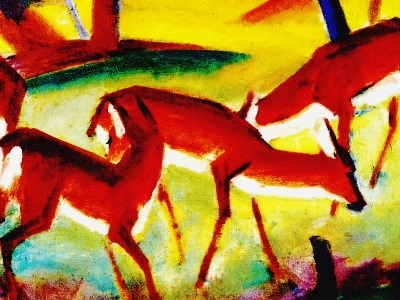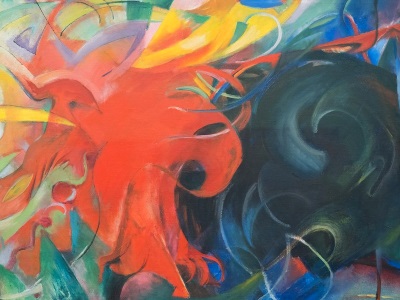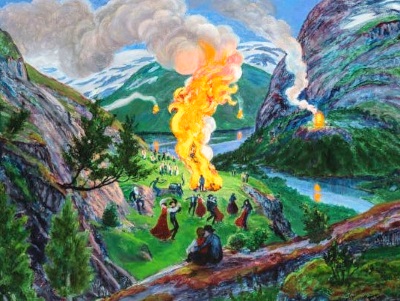Youth wants to blast away the walls which have been erected between what is personal and what is universal. It is clear that in such a struggle one must speak consciously of a religious experience. For the forces that are fighting to free the strengths of the soul are religious in character. In contrast to the self-perceived personality that is unessential and split, the true unified self of the soul wants to penetrate through to the light of the divine being.
If we want to comprehend the primeval origin of the world as that which is divine, without separating good from evil and light from darkness, the soul of the cosmos becomes a mixture of God and the devil. One wants everything – the darkness of every fall as well as the shimmering light and joy of every climb upwards; one desires to be stretched out through the world, so as to feel and experience simultaneously everything – in every animal and tree, in every person and object. But in this way the inner conflict of the soul is intensified to such boundless enormity that Werfel, experiencing it, has to cry out: “Why have you created me with this enemy, my Father? Why have you made me to be thus divided? Why have you not given me oneness and purity?”[1]
It is obvious that God’s identity cannot be found along this way. Neither can the identity of one’s own soul ever in this way win the necessary inner unity. By trying to clutch at everything at once, one loses oneself and every possibility of attaining the divinity one longs for. It is shown inexorably that the riddle of existence defies solution as long as one avoids the great decision. With an attitude of question-less acceptance we shall not fathom the mystery of life and of the world.
The attempt to merge, without discrimination and without restriction, with all the world’s elements can never lead to the desired inner harmony, nor to the unity which we believe to be necessary. The deepest reason for this is to be found in the realities of the spiritual world. For what is at work in the world around us and within us is not only God and the living Christ, but, in opposition to them, other spirits which are quite different in their inmost nature. The world is not only a world of light and life; it is just as much a world of death and of darkness. Every struggle for the highest and purest in life means war against the powers that are low and filthy. Nietzsche, who wanted to say “yes” to everything, however questionable, confessed: “That, that is my edge of the abyss and my peril, that my gaze leaps upwards to the heights, while my hand would hold onto and shore up the depths.” Honesty urges him to warn his followers: “Your evil impulses also thirst for freedom. Whomever the Spirit has set free must also still be cleansed.”[2] The soul is the mirror for all the relationships of human beings. Every touching of the unclean and putrid pollutes the inner and inmost being, with the result that the stream of destructive elements, let in from without, rips up and chokes with its mud, as if forever, the desired unity and wholeness.
Yet the fight for the wholeness of the universe can and must nevermore be given up. Some kind of a solution must be found. The young feel impelled to struggle for the soul of the world and must not let themselves be deterred by the evil they find in it. They must seek to win through to the core of life, for they are dissatisfied to live without it.
Among today’s youth, too, many do not get beyond this boundless religious confusion, where people want to embrace at one and the same time everything alive in the world – light and darkness, beauty and ugliness, good and evil. The urge of wanting to possess everything robs our vision of its power of discernment. It makes the heart an indiscriminate sea, receiving into itself all manner of rivers, whereas it ought to be a light in which everything becomes revealed and undergoes the necessary sifting. It is the murky darkness of the crowd spirit, of the god of this world who has here blinded and infected the inner eye. People want the light of truth, yet they remain in the twilight of lying. They want life in its fullness, yet are unable to distinguish the murderer of human beings from the prince of life.
“Only those whose wisdom comes from God are wise,” says Stefan George.[3] And Friedrich Schlegel, as spokesman for the Romantic movement, has contributed a fitting summary: “I can only respect as religion that which is thought and written and lived in a godly way; where people are full of God; where a breath of worship and enthusiasm is poured out over our whole being; where nothing is done as a duty, but everything out of love, simply because one wants to do it; and where one wants to do it because God says so: that is to say the voice of God within us.”[4] Only the voice of God is able to call forth this holy will of love. Although we do not see his figure, yet it is his personal influence that begins to direct the soul. The soul does not yet feel confronted by his countenance, his eye and his heart. But it hears his call. We do not yet see the God we hear. We are unable to confess anything about him other than that he has quickened our hearts, and only he has our allegiance.
It is not sufficient to want to portray this basic experience of today’s more serious minded youth as being no more than Kant’s understanding of personal freedom.[5] Certainly at first glance it seems to be nothing but the self-determination of one’s own responsibility. Certainly it is a question of the will – that is a law unto itself; independent of all preoccupation with the state of things, and above all independent of any influences exerted by authority and tradition.
Above all, however, it is the concern of today’s movement that not the logical clarity of the guidelines be decisive, but that each individual conscience hears the voice of God anew. The holy “Thou shalt” is experienced not only as freedom from authority and from research relying on observation alone, but above all as something which supersedes mere thought. The holy will we are experiencing derives from a world that proves to supersede the logic of our thoughts. It is therefore all important that we should let nothing hinder or obstruct our recognizing and experiencing the character of the living God just as he reveals it to us.
The romanticists of earlier times strove to embrace and experience everything equally, but they had to confess: “There is only a hair's breadth between good and evil, between the pietist and the blasphemer.” If we recognize what is within us with unconditional truthfulness, we find the human heart to be as completely evil as it is truly good. Thus the ultimate clarity of rebirth, the real liberation of life’s energy, the unhindered life of the personality attained in God, all this can be brought about only by our acknowledging also the final debasing alloy, the most painful contradiction of all.
“The Lord is the Spirit. Where the Spirit of the Lord is, there is freedom” (2 Cor. 3:17). This freedom implies that the soul has a part in the whole sphere of the creative power of Christ, without whom nothing that is and lives has come into being (John 1:3). In this Spirit we attain to that all-embracing affirmation of life which is active in joyful, unstinting energy in the resistant world. The Spirit needs matter to work on. Love has won form and shape in Christ. His Word desires to become deed in our lives. The love of God is poured out into our hearts (Rom. 5:5). By experiencing his love for us, we are enabled to love. Translating the strength to love into reality means action.
Only in love for God and love for one’s neighbor does religious life prove itself. For it is the character of the holy “thou shalt” that it must bring forth deeds of holy love. Love is movement, love is deed. Life will prove, and deeds will decide where the impulses of God’s power are strongest, where God is able to work most freely among our young people who are so moved by such varied religious influences.
Article edited for length and clarity. View original document in our digital archive: The Religious Sentiment of Today's Youth.
[1] Franz Victor Werfel 1890 – 1945, Austrian novelist, playwright, expressionist poet.
[2] Friedrich Nietzsche 1844 – 1900 German philosopher.
[3] Stefan George 1868 – 1933 German Symbolist Poet.
[4] Friedrich Schlegel 1772 – 1829 German poet, writer and Indologist.
[5] Immanuel Kant 1724 – 1804 German philosopher.


